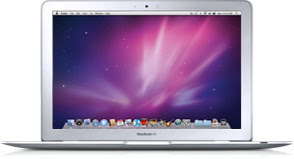More and more of my activity, both in desktop and mobile computing, is cloud-based. More Web services are replacing desktop applications, while activities that used to be the focus of local storage (including photos, music, video and email) are being delivered from the Web instead. But I'm not totally converted yet, and I can see how even the most forward looking of early adopters could still have some hangups in being fully cloud-enabled. To get to a cloud utopia, work has to be done not just on the operating system side, but on native apps, and peace of mind has to be delivered for users that they will lose no data or functionality in that transition.
In January of last year, anticipating a more cloud-centric future, I moved to a MacBook Air, one that had about half the storage space as my previous laptop, reversing the trend of larger and larger trays of spinning disk. Using the same device 16 months later, I haven't gotten close to using up the 128 gigabytes, although I have to admit I ended up installing a lot more programs on it than I had originally hoped.
Even with this admission, I kept the older MacBook Pro around under the guise of it acting as my "media machine", the master data set of all my music, photos and video. While I walked away from iTunes for music, every few months I'd transfer the latest home photos and videos via USB from the AIr to the Pro. Some got posted online and others not. With Google Music and Picasa offering options to upload all this content to the cloud, I know I'm just a few painful uploads away from finally migrating (once I get a new battery and charge the sucker).
Google's pitch for everything being on the Web is smart and future-looking, but it neglects, for consumers anyway, the story of migration, from one OS to another and also from one frame of mind to another. As Gmail once did with its offering a gigabyte of storage space at a time when competitors offered tens of megabytes, I have to think that letting people copy their important files to the cloud in a personal storage locker would be quite compelling. Steven Levy's "In the Plex" recounts the demise of a Google project "GDrive" thanks to its file centricity, but real consumers have real files and want to know they will never lose them in the future.
For me to truly get to the cloud one hundred percent of the time, I still need to:
- Convert my DRM-laden Apple iTunes songs to DRM-free MP3 files
- Synchronize those songs with Google Music and Spotify
- Upload all my photos from iPhoto to Picasa and/or SmugMug
- Migrate all my .Mac email archives to GMail
- Migrate old Word documents and PowerPoints to Google equivalents
#3 touches on emotion as much as data. There's comfort for some in burning old photos to DVD, even if DVD (and CD-Roms and floppies before that) are holdovers to a doomed era in physical media. And songs are songs. I love my Spotify, but I bumped into an old Underworld album I own on iTunes that I hadn't seen in years and was reinvigorated to reclaim all that stuff I've purchased, so I wasn't walking away from thousands of dollars in investment, but also favorite tunes I might not remember later.
I have been using the CR-48 Chromebook more and more lately, using it exclusively at the Google I/O, SXSW and CES events, thanks to its great battery life and ease of access to 3G and WiFi connectivity. I am using the Chromebook more and more at home too, when I don't need to use Photoshop or take partial screenshots - something the Mac still does better than anything else I've seen.
I see the current state of Chrome OS as that of Mac OS X 10.0 upon Apple's launch of that operating system back in 2001. It didn't initially support DVD playing, and scads of programs were missing, forced to boot in Classic mode, including the aforementioned Adobe Photoshop and notably, Quark Express, key for the Mac's design culture. But eventually those holes were filled, and Mac OS X hasn't looked back in a decade.
Can Web apps replace Photoshop and other intense programs outright? Probably not on day one and maybe not even before the end of 2012. Google promised close tie-in with Citrix and VMware, telling the story of virtually connecting to apps outside of the cloud, and using them there. That's a really geeky solution to what would be a standard use case on a more traditional platform. I have to imagine that if Chrome and other cloud-centric options grow, traditional software makers (as Microsoft did with its Web office in response to Google Docs) have to start thinking about getting their apps into users hands on these new platforms, while the earliest users are going to have blood on their hands thanks to being on the cutting edge.
We're in the early days of a true cloud OS, and I've got a lot more room myself to go before I close the lid on my last MacBook. Agreeing in principle that I need to get my important data of rusty spinning disk, I have some work to do, and will keep up this effort. But more messaging has to address the issues of migration, storage space, compatibility and success in places where connectivity isn't pervasive.


